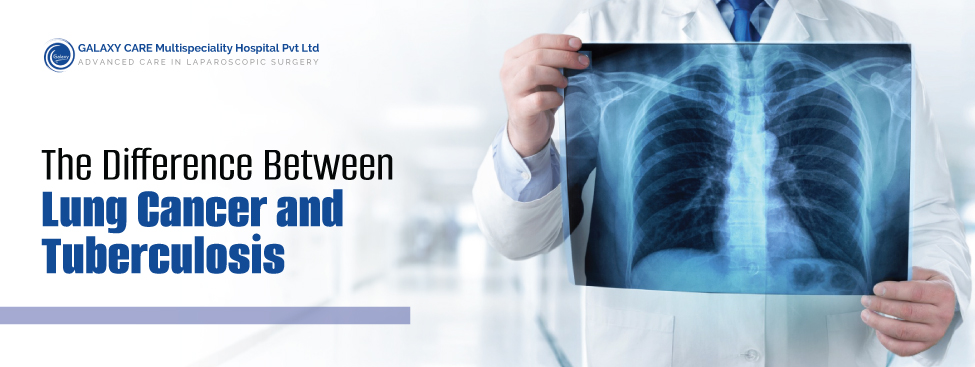
The Difference Between Lung Cancer and Tuberculosis: Don’t Confuse the Symptoms
Diseases affecting the lungs can sometimes present with similar symptoms, causing confusion among patients and even some doctors until diagnostic tests reveal a clear picture. Two of the most commonly misunderstood lung-related conditions are lung cancer and tuberculosis (TB). Although both diseases can severely impact lung function and quality of life, their causes, treatment pathways, and prognoses are distinctly different. With the rising prevalence of lung cancer and the persistent burden of TB in India, understanding these differences is crucial for timely and appropriate care. If you are searching for a lung cancer specialist in Pune, it is especially important to distinguish these conditions early for the right consultation and treatment. Let’s dive deeper into understanding the key difference.
Understanding Lung Cancer and Tuberculosis
What is Lung Cancer?
Lung cancer is a malignant disease that begins in the tissues of the lung, usually in the cells lining the air passages. It can start as a small growth and may spread to other parts of the body if not detected early. Lung cancer is one of the leading causes of cancer-related deaths worldwide and often requires intervention from a dedicated lung cancer specialist for the best outcomes.
What is Tuberculosis?
Tuberculosis is an infectious disease caused by the bacterium Mycobacterium tuberculosis. It primarily affects the lungs, though it can spread to other organs. TB is a major public health concern, especially in developing countries, and requires prolonged antibiotic treatment for a complete cure.
How They Differ
Causes of Lung Cancer
- Primarily caused by prolonged exposure to carcinogens, most notably tobacco smoke.
- Other risk factors include exposure to secondhand smoke, environmental pollutants, occupational hazards (like asbestos or radon), and a family history of lung cancer.
- Genetic mutations acquired over time can also play a role.
Causes of Tuberculosis
- Caused by the airborne transmission of Mycobacterium tuberculosis from person to person through coughing, sneezing, or speaking.
- Individuals with weakened immune systems (such as those with HIV/AIDS, diabetes, or severe malnutrition) are more susceptible to contracting TB.
- Living or working in close quarters where TB is common increases the risk.
Symptom Similarities: The Roots of Confusion
Many initial symptoms of lung cancer and tuberculosis are remarkably similar. Here are some overlapping symptoms:
- Persistent cough (lasting more than two weeks)
- Unexplained weight loss
- Chest pain or discomfort
- Shortness of breath
- Fatigue
- Coughing up blood (hemoptysis)
These common features often lead patients to mistake one disease for the other, potentially delaying the right diagnosis and treatment.
Distinguishing Symptoms: What Sets Them Apart?
Unique Signs of Lung Cancer
- Hoarseness or changes in voice: This can happen if the tumor involves nerves supplying the vocal cords.
- Recurring bronchitis or pneumonia: Blockages by tumors can lead to repeated infections.
- Bone pain: Advanced lung cancer may spread (metastasize) to bones, causing pain.
- Swelling in the face or neck: Tumors pressing on blood vessels can cause visible swelling.
Unique Signs of Tuberculosis
- Night sweats: Excessive sweating, especially at night, is more characteristic of TB.
- Fever with chills: TB typically presents with a low-grade fever that persists, along with chills.
- Loss of appetite: While both diseases can cause weight loss, TB often leads to pronounced appetite loss.
- Gradual symptom onset: TB symptoms often develop slowly over weeks or even months.
How Doctors Distinguish Between Lung Cancer and TB
Diagnostic Approach for Lung Cancer
- Imaging Tests: Chest X-rays, PET-CT scans, or MRI to visualize suspicious areas.
- Biopsy: A definitive diagnosis requires tissue sampling, often guided by bronchoscopy or needle biopsy.
- Molecular Tests: To understand cancer type and plan targeted therapies.
If you seek care from a lung cancer specialist in Pune, expect a systematic and thorough diagnostic process using advanced technologies for accurate assessment.
Diagnostic Approach for Tuberculosis
- Sputum Exam: Microscopy and culture of sputum to detect the TB bacteria.
- Tuberculin Skin Test or IGRA: Helps determine exposure to TB bacteria.
- Chest X-ray: While helpful, it must be interpreted with caution as some forms of lung cancer can mimic TB on radiographs.
- GeneXpert: A rapid molecular test for quick TB detection and drug resistance profiling.
The Importance of Timely Medical Evaluation
Delaying medical attention for symptoms like persistent cough, blood in sputum, or unexplained weight loss can lead to serious consequences. Early diagnosis facilitates prompt and correct treatment, improving survival rates for lung cancer and ensuring full recovery from TB. If confusion arises, consulting a lung cancer specialist in Pune or an experienced pulmonologist ensures you receive the right investigations and care.
Risk Factors and Prevention
How to Reduce Your Risk of Lung Cancer
- Avoid smoking: The single most effective preventative measure.
- Limit exposure to secondhand smoke, radon, and workplace carcinogens.
- Maintain a healthy diet and lifestyle.
- Undergo regular screening if you are at high risk.
How to Prevent Tuberculosis
- Vaccination: The BCG vaccine offers protection, especially in childhood.
- Practice good respiratory hygiene: Avoid close contact with people who have active TB.
- Ensure adequate nutrition and overall health: To keep your immune system strong.
- Seek prompt treatment for latent or active TB to prevent spread.
Why Self-Diagnosis Can Be Dangerous
Relying on online information or home remedies to manage serious lung conditions can be life-threatening. Misinterpreting symptoms may delay a correct diagnosis, allowing lung cancer to progress to an advanced, less treatable stage, or causing TB to spread in the community. Only a qualified doctor—ideally a lung cancer specialist in Pune for cancer concerns, or a TB specialist for infectious symptoms—can provide precise diagnosis and tailor-made treatment.
Seek Help for Correct Diagnosis
Mistaking lung cancer for tuberculosis, or vice versa, can be fatal. While their symptoms often overlap, their causes, treatments, and outcomes are very different. Early and accurate diagnosis is vital. Never ignore persistent respiratory symptoms; consult a qualified specialist promptly.
At Galaxy Care Hospital, Pune, we are committed to delivering world-class care for patients with lung cancer. Our facility is equipped with advanced diagnostic tools, a state-of-the-art robotic theatre, and a team of empathetic experts well-versed in handling complex lung diseases. If you or a loved one is concerned about persistent lung symptoms, don’t wait. Consult your lung cancer specialist in Pune at Galaxy Care Hospital for guidance, accurate diagnosis, and compassionate care.
Take action today—your health and peace of mind are our top priorities.


